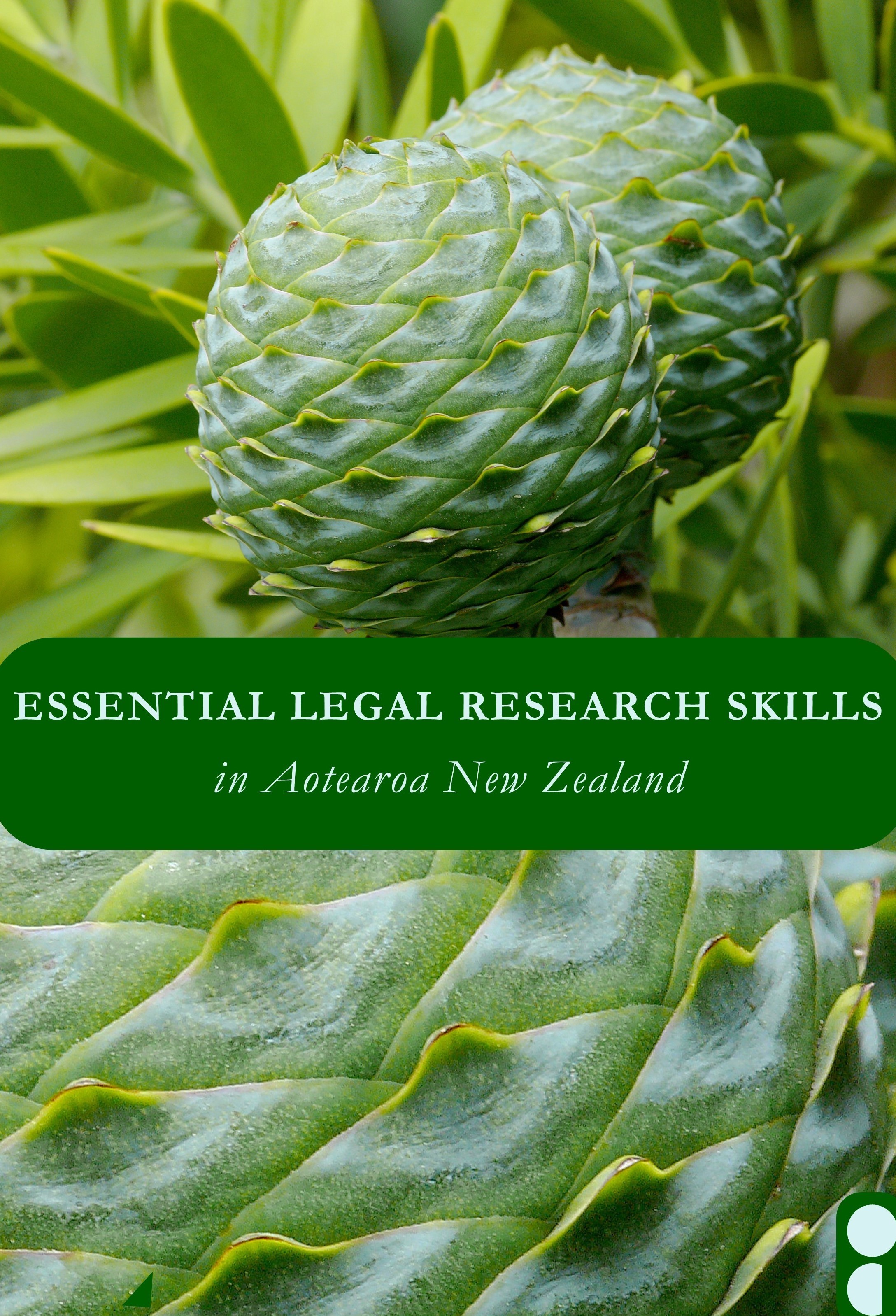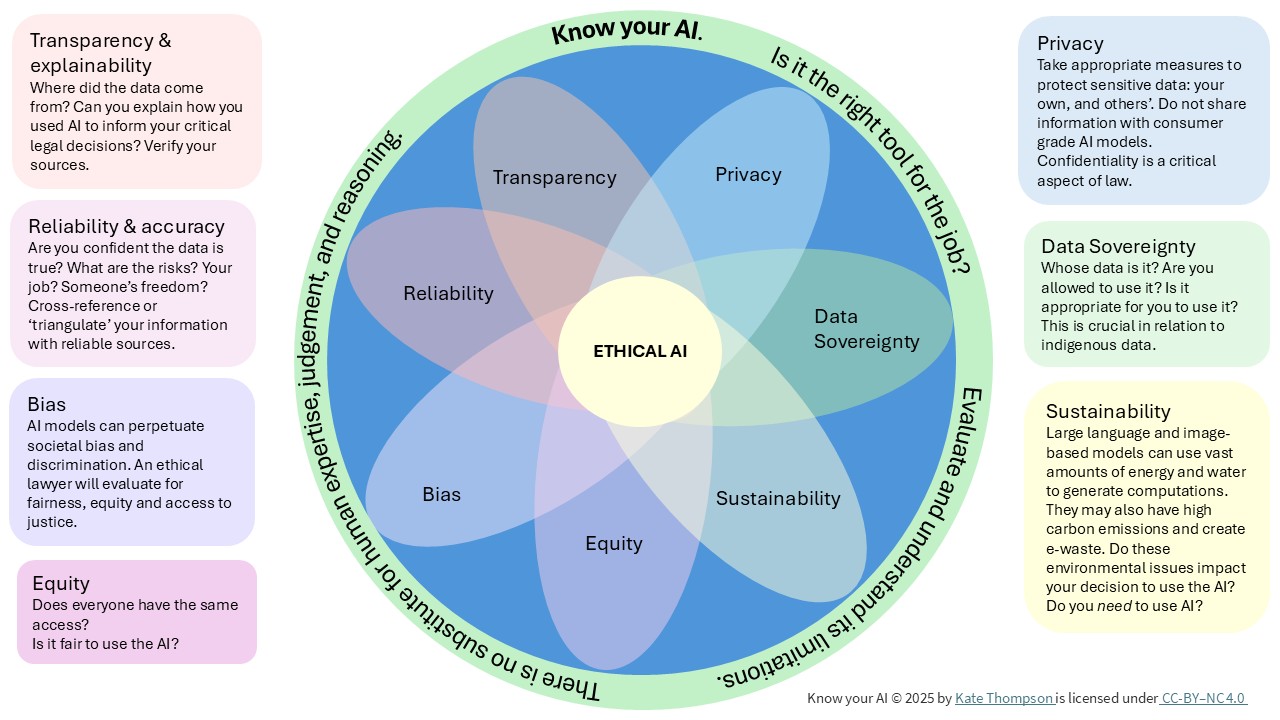Law subject guide: Research strategies
The legal research process
Evaluating Sources
Be confident about accuracy and authority by accessing content from commercial databases, textbooks, and primary sources.
Beyond these resources, you will have to evaluate the quality, authority and accuracy yourself.
Watch this video about SIFT. Stop. Identify. Find better coverage. Trace.
Legal Research Texts
These texts offer practical advice in research and writing, with a strong NZ law focus.
-
Essential Law Research Skills in Aotearoa New Zealand
 Theresa Buller (ed) Essential Legal Research Skills in Aotearoa New Zealand (eBook ed, University of Auckland, Auckland, 2025).This guide to legal research and citation of New Zealand law provides direction to students undertaking legal research. It may also be useful for members of the public and self-represented litigants. It covers the core skills and knowledge for effective legal research, such as creating a search strategy, identifying where to locate legal information and legal citation using the New Zealand Law Style Guide. This text explores searching for sources of legal information including case law, legislation and commentary and explains the different approaches required to locate and cite these sources of law
Theresa Buller (ed) Essential Legal Research Skills in Aotearoa New Zealand (eBook ed, University of Auckland, Auckland, 2025).This guide to legal research and citation of New Zealand law provides direction to students undertaking legal research. It may also be useful for members of the public and self-represented litigants. It covers the core skills and knowledge for effective legal research, such as creating a search strategy, identifying where to locate legal information and legal citation using the New Zealand Law Style Guide. This text explores searching for sources of legal information including case law, legislation and commentary and explains the different approaches required to locate and cite these sources of law
-
Legal research in New Zealand by Russell, Mary-Rose (ed)
Call Number: Law K79 .L44 2015 -
Legal writing : a complete guide for a career in law by Dorset, Simon et al
Call Number: Law K101 .D674 2015 -
New Zealand law : foundations and method by Penk, Stephen, & Russell, Mary-RoseCall Number: Law KL35.1 .P466 2018
-
Taking Your Research Skills to the Next Level. by Anderson, Robin & de Friez, Julia.Publication Date: 2016A booklet of a NZLS / CLE webinar.
Database Guides
These short and simple videos introduce you to the mechanics of searching for legal resources. You can also ask for help, at the Desk.
-
CCHiKnowConnect HelpIncludes short videos, print guides, and links to webinars.
-
HeinOnline HelpIncludes a variety of instructional videos, and webinars.
-
WestlawNZ HelpIncludes short videos and guides, plus links to webinar training times.
Legal research guides
The Research and Writing Guide, and the three step-by-step Legal Research Skills guides are also available on Blackboard. LAWS398 > Course Documents.
-
Faculty of Law Legal Research & Writing GuideRead this to get guidance on legal writing, and how to perform legal research at Otago.
-
LAWS398 Legal Research IntroductionThis step-by-step guide includes background information to get you started.
-
Putting it all together: SlideshowIn which we discuss strategies for doing good legal research.
Primary Sources
-
LAWS398 - Find CasesThis step-by-step guide will help you find and use primary sources: cases.
-
LAWS398 - Find StatutesThis step-by-step guide will help you find and use primary sources: statutes.
-
Flow Chart - Find a reported case: two examplesFrom a reference to the full text, and every step in between.
-
Flow Chart - Find an unreported decision: two examplesFrom a reference to full text, and every step in between.
Secondary Sources
-
LAWS398 - Find Secondary SourcesThis step-by-step guide will help you find secondary sources: books, journal articles and commentary.
-
How to plan a research project: four stepsWhether for a paper or a thesis, define your question, review the work of others – and leave yourself open to discovery. By Brooke Harrington
Publishing Tips
-
List of New Zealand Law JournalsList includes tips for finding online NZ journals. Updated August 2021.

Copyright ownership, Open access, and publishing in Law Journals.
Copyright Experiences wiki: This is a US resource that focuses specifically on law journals and is a place where legal academics can share experiences they’ve had when negotiating copyright with law journals and other legal publishers.
Copyright, authors rights and open access. This is post on the SLAW site, Canada's online legal magazine. The post includes helpful links to tools to help assist your decision-making.
Want to publish in an Open Access Law Journal? This website from the American Bar Association has a good list.
Free Online full-Text Law Reviews/Journals
Consult this locally developed comprehensive guide into research, publishing, and impact.
Keeping up to Date
There is no panacea for keeping up to date with NZ law in academia.
Try this range of resources and you'll at least be well informed!
-
Capital LetterCurrent awareness, NZ cases and legislation. Updated daily.
-
Legislation New ZealandCreate web feeds to come to your email. The Feeds can be general e.g. all bills, statutes and statutory instruments in the last 30 days, or specific e.g. all changes to a specific Act over a time.
-
Law NewsThe weekly newsletter from the Auckland District Law Society.
-
New Zealand Law SocietySign up to their weekly newsletter and keep abreast of Law Commission activities, Select Committee Reports, new bills and cases and media releases.
-
The Law ReportSign up for a weekly email alert and receive headlines of news, articles, and new legislation and cases.
To keep up to date on secondary sources, you can also set up Table of Contents (ToCs) alerts for many journals. Search for the journal via Library Search. Each publisher will have a unique but easy set-up process. You cannot set up ToCs for journals via Westlaw or Lexis.
-
JournalToCs - LawA good range of tables of contents for a variety of law journals.
- Last Updated: Nov 4, 2025 11:02 AM
- URL: https://otago.libguides.com/law
- Print Page

